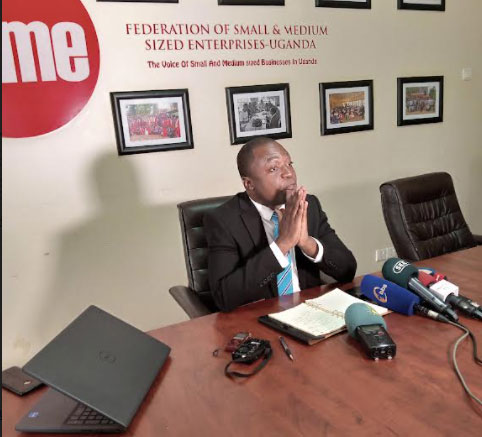
Kampala, Uganda | THE INDEPENDENT | The Executive Director of the Federation of Small and Medium-sized Enterprises-Uganda (FSME – Uganda), John Walugembe has urged government to involve Parliament while dealing with investors that seek opportunities in Uganda.
In an interview with journalists in Kampala, Walugembe cited the current controversial coffee deal that the Ministry of Finance signed with an Italian Investor that has caused uproar among the sections of legislators, farmers and private sector bodies due to lack of transparency and deep stakeholder engagement.
“We recognise the noble objective government seeks to pursue of promoting value addition in the coffee sector, however we are opposed to this deal,” he said.
On 10 February 2022, Finance Minister Matia Kasaija on behalf of Government signed an agreement with Uganda Vinci Coffee Company Limited (UVCC) owned by an Italian investor, Enrica Pinetti to have exclusive rights to buy Uganda’s coffee for processing on top of several incentives and concessions extended to the same coffee company that among others include; allocation of 27 acres of land at the Industrial Park in Namanve, government to construct an access road linking the plant to the main access road, power transmission to the plant at government’s cost and exemption from all kinds of taxes.
“This means this company is literally taking on zero risk for this project,” Walugembe said.
“An agreement of this nature that has a bearing on the livelihood of so many small and medium sized businesses engaged in the sector should only be developed after intense and comprehensive consultations,” he said.
He said, foreign investors coming in the country should pay for electricity, water and remit taxes at the same rate the local SMEs do.
Walugembe also urged Parliament to reduce the discretionary powers of the minister of finance to give incentives to whom they want, because this is not useful.
To that effect, he said, government should put together a committee that scrutinizes these deals and conducts thorough research and make recommendations. Any incentives related to such deals must be provided after the approval by Parliament.
He also said, any tax incentives should be linked to clear targets and if an investor in the past has failed to fulfil an agreement, they should automatically be removed from the list of those being incentivised.
He also said, there has to be rigorous monitoring to ensure that such incentives are not abused by investors and bureaucrats.
 The Independent Uganda: You get the Truth we Pay the Price
The Independent Uganda: You get the Truth we Pay the Price



